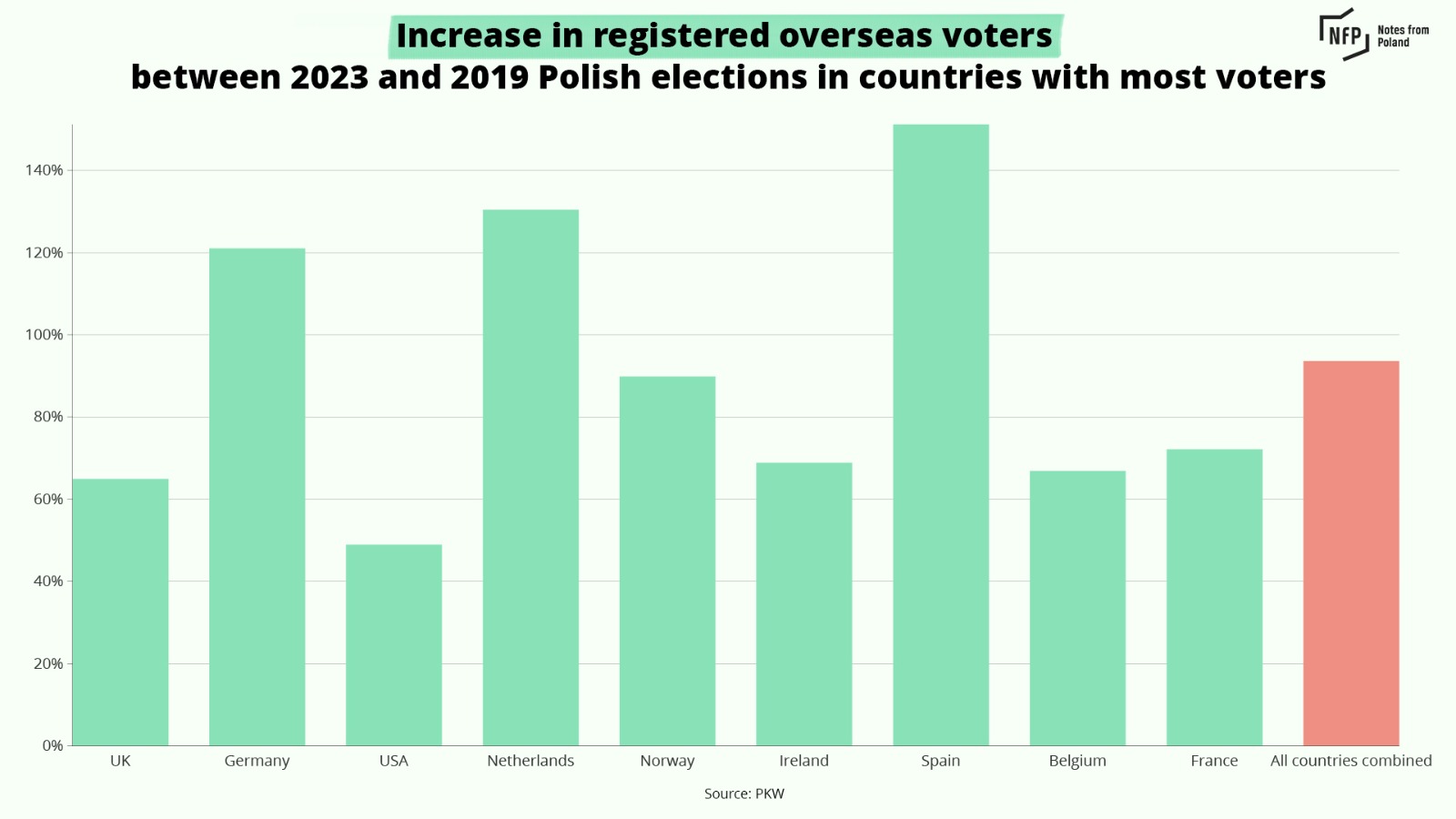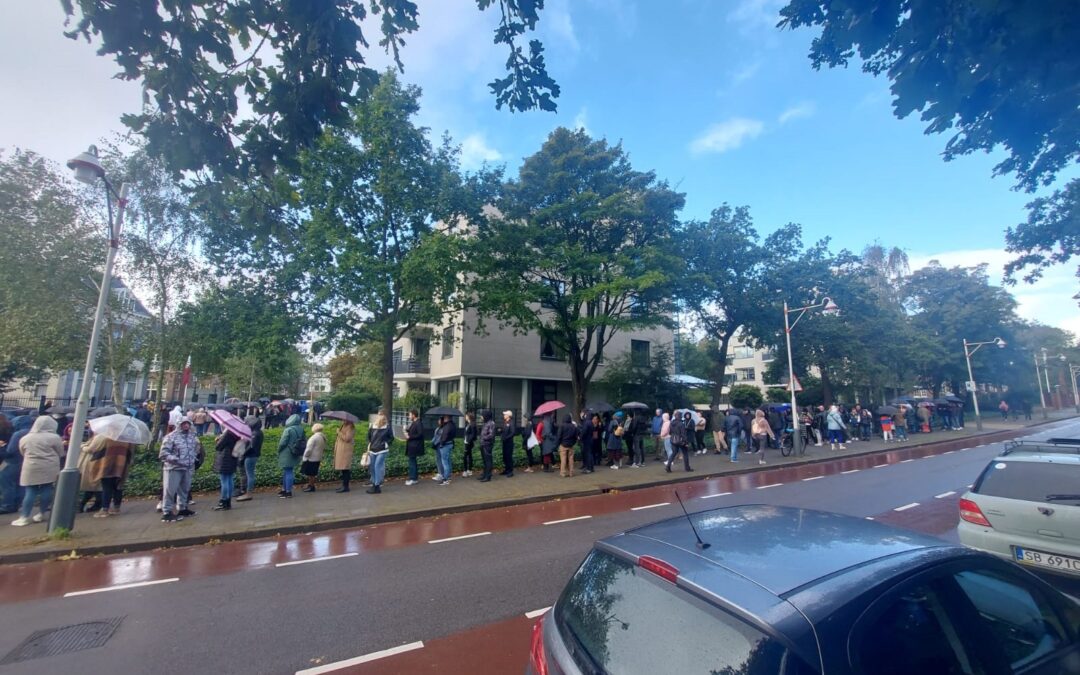By Agata Pyka
Turnout in yesterday’s Polish parliamentary elections – at 73%, according to the exit poll – was the highest ever recorded. That included a record number of Poles voting abroad. Over 600,000 registered to do so, almost double the figure at the last elections in 2019.
That unprecedented interest resulted in large queues at many overseas polling stations, especially in western Europe. The Netherlands in particular saw a big rise in voter numbers, with a greater increase in registrations (130%) than in any other large country apart from Spain (151%).

Despite the long lines, the sense of excitement was palpable. “I’ve never been so happy to stand in a queue,” one woman said to a friend while waiting outside a polling station in The Hague.
Speaking to voters, a common theme was that this election felt different – and more important – than others in the past. In particular, there was anger towards the ruling Law and Justice (PiS) party and the near-total ban on abortion introduced under its rule.
“I don’t usually vote. This was the second time in my life that I voted – I’m 36. The situation in Poland has forced me to do so,” one woman told Notes from Poland. A resident of the Netherlands, she works for Abortion Network Amsterdam and voted for The Left (Lewica), the party with the most progressive platform on reproductive rights.
“I had this vision that if I don’t go to the polls now, in four years women won’t be able to vote anymore. Violation of women’s rights in Poland, the abortion ban, women dying ‘from birth’ in hospitals – these were some of my main motivations for going to vote today,” she added.
The queue in Dusseldorf, Germany of Poles waiting to vote in today's elections https://t.co/LsrJ6KKr66
— Notes from Poland 🇵🇱 (@notesfrompoland) October 15, 2023
Another woman – who has been living in The Hague for 20 years and works in maternity care – offered a similar message. “A few years ago I didn’t vote, but now I’ve decided that a substantial change is needed,” she said.
“Here [in the Netherlands] a woman has a choice. In Poland, women have been deprived of their voice and they are actually trying to take that voice away from everyone, to invigilate, to control. I hope this will change,” she added.
Many others waiting in line also said that they do not normally vote, but felt that now it was necessary to bring about change.
“I have not voted before. Now I hope that something will change. My opinion is that there should be fresh faces,” a middle-aged construction firm owner, who has been residing in the Netherlands for six years, told us.
To him, too, living abroad contrasted with the reality back home. “It’s better here [in the Netherlands]. In Poland I lived with my mother, in a little room, I couldn’t afford to rent. Here I rent a flat,” he explained, adding that he had also opted to support The Left.
A Polish voter in Palermo, Italy says that she has been waiting for three hours in 32°C temperatures and there is still "no end in sight but we won't give up" https://t.co/yB8nk8gniU
— Notes from Poland 🇵🇱 (@notesfrompoland) October 15, 2023
For some, living abroad posed a dilemma. “I was wondering whether to vote since I live abroad. But I’ve decided that I have my candidates and I’ll give them one last chance. It’s either them or nobody, and if they don’t do anything now it’s their last chance. Potentially this is my last election,” said one man who chose to support the far-right Confederation (Konfederacja).
All of those we talked to pointed to a positive atmosphere within the long queues. “I felt that everyone in line was excited, thinking ‘I can do something about it’, ‘my vote has power’. Four years ago that wasn’t the case,” said the woman working in maternity care.
“This is definitely a different election from previous ones. You can feel the nation stir. There are definitely more people than in previous years,” added a man who has lived in The Hague for eight years.
There are large queues at polling stations in London where Poles are voting in today's parliamentary elections https://t.co/yXx16mtRSi
— Notes from Poland 🇵🇱 (@notesfrompoland) October 15, 2023
“I feel full of hope. It’s great to see so many Poles,” said a woman who had come to vote with a group of friends. They moved to the Netherlands for a few weeks of seasonal work but ended up staying for a few years.
“Every election is important. But now you feel a kind of tension. There is a lot of pressure to vote in this election,” they added. “Eight stars – first and foremost,” they concluded, giggling, referring to a vulgar slogan (**** ***, standing for “F**k PiS”) expressing opposition to the ruling party.
Among those we spoke to, none said they were voting for PiS. At the last elections, in 2019, the party won only 15% of votes among Poles in the Netherlands, compared to its result of 44% among all voters.
The #exitpoll from Poland's elections indicates that, although the ruling party came first, it has lost its parliamentary majority and that an opposition coalition could form a government.
See our full report by clicking here ⬇️ https://t.co/zxk5axl6No
— Notes from Poland 🇵🇱 (@notesfrompoland) October 15, 2023

Notes from Poland is run by a small editorial team and published by an independent, non-profit foundation that is funded through donations from our readers. We cannot do what we do without your support.
Main image credit: Agata Pyka

Agata Pyka is a former assistant editor at Notes from Poland. She specialises in Central and Eastern European affairs, cybersecurity, and investigative reporting. She holds a master’s degree in political communication from the University of Amsterdam, and her work has appeared in Euractiv, the Balkan Investigative Reporting Network (BIRN), and The European Correspondent, among others.



















